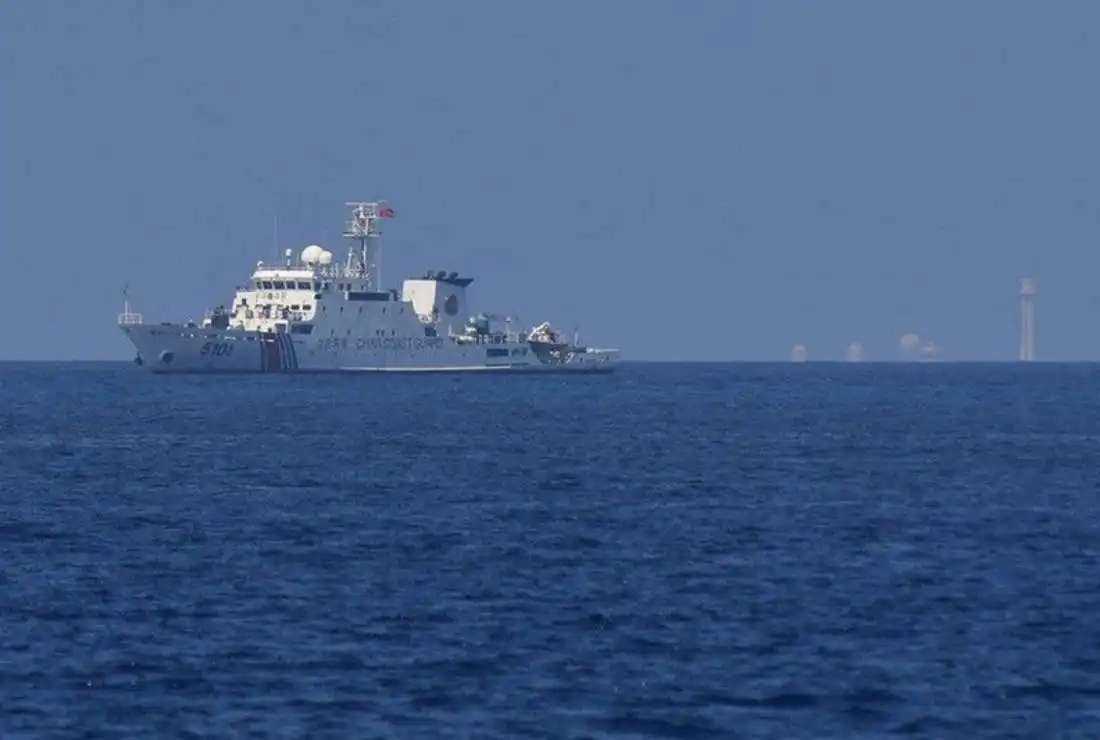
This photo taken on April 21 shows a Chinese coast guard ship patrolling before Subi reef (right) near the Philippine-occupied Thitu island in the disputed South China Sea. (Photo; AFP)
About 50 Chinese vessels allegedly swarmed disputed maritime territories near a Philippine Island, jeopardizing the lives and livelihoods of hundreds of fishermen and their families, local residents say.
Fishermen from Masinloc island in Zambales province alleged they have stopped fishing in the disputed waters “out of fear.”
The island is home to about 54,000 people, according to Philippine Statistics Authority.
The fishermen have called on the authorities to take measures to disperse Chinese vessels within the vicinity of Iroquois Reef and Sabina Shoal, which are known for their rich biodiversity where fishermen catch tuna, crabs, and lobsters.
“It’s our fishing ground where we catch tuna and sea shells. Now, we don’t have any income because we cannot go near the area,” fisherman Robert Alquaro, 45, told UCA News.
Alquaro said they could go to other parts of the West Philippine Sea, the Philippine name for disputed parts of the South China Sea, but they cannot catch as much fish as in Iroquois Reef and Sabina shoal.
In other places, they have poor catches despite spending more time and gasoline, he claimed.
“Our families are getting hungry. We can catch fish only to feed ourselves but not to finance our children’s education,” Alquaro added.
Alquaro’s wife, Sonia, 42, who used to accompany her husband in a rented boat, said she’d rather stay home and take care of their two children.
She said they could earn about 20,000 pesos (US$364) per night from a good catch, but not anymore.
“Now, we can barely make 7,000 pesos. With the high price of gasoline, there will be nothing left soon,” Sonia told UCA News.
The Western Command of the Philippine military spotted the Chinese vessels including Coast Guard and navy ships during its air patrol on June 30, the Philstar newspaper reported on July 7.
The Philippine government lodged a diplomatic protest, while the military called the Chinese action “alarming” and “a potential threat.”
Senator JV Ejercito called on President Ferdinand Marcos Jr. on July 7 to directly discuss with Chinese President Xi Jinping the “very unhealthy situation” after the diplomatic protest seems to be ignored, the Daily Inquirer reported.
Fishermen claimed the crew of the Chinese vessels had bullied them amid ongoing disputes over maritime territories.
“We were shot with water cannons while fishing last month. Their vessels are big and made of iron. They have huge generators that are capable of pumping water to use water cannons against Filipino fishermen,” fishermen Francis Grumba, 38, told UCA News.
Grumba, together with his cousin Marcelo, 33, owns a fishing vessel. He says they will go out fishing again only after the Chinese ships are gone.
“That’s when we can go there. Our lives are more important,” Grumba added.
Marcelo, however, said he is considering taking the risks because he needs to pay his daughter’s school fees.
“The semester is about to start, and I still don’t have money for my daughter in the [vocational] college. I can’t wait for the government to intervene to stop these Chinese vessels,” Marcelo told UCA News.
Philippine Defense Secretary Gilbert Teodoro said the government is still trying to end the stalemate with diplomatic efforts.
“There is no concrete step yet, but rest assured we will act on this. We have already called the attention of the Chinese ambassador and we are hoping they will have a positive response to this complaint,” Teodoro said in a press conference on July 7.
For decades, China has claimed sovereignty over 90 percent of the South China Sea, which reportedly has a reserve of estimated 11 billion barrels of untapped oil and 190 trillion cubic feet of natural gas, according to the Council on Foreign Relations, a global think-tank.
China’s sweeping claims have angered competing claimants Brunei, Indonesia, Malaysia, the Philippines, Taiwan, and Vietnam. As early as the 1970s, countries began to claim islands and various zones in the sea which possess rich natural resources and fishing areas, the council added.
In 2016, the Philippines won its case against China in the United Nations-backed Permanent Court of Arbitration, which ruled out Beijing’s claim.
However, the ruling did not stop China’s provocative actions in the disputed waters.
The United Nations expressed concerns over what it called Beijing’s “coercive and risky” behavior in the contested waters.


